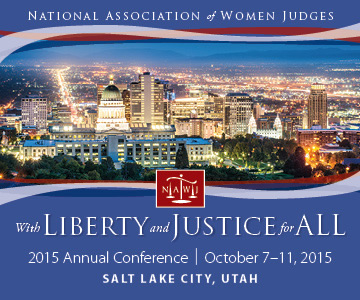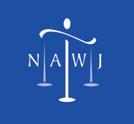2015 Annual Conference - CLE

NAWJ 37th Annual Conference
With Liberty and Justice For All
October 7-11, 2015 • Salt Lake City, UT
Conference Guide (includes all Speaker Bios)
Annual 2015 Conference
SCHEDULE OF SESSIONS
| THURSDAY, OCTOBER 8 | |
| 9:30 AM-10:30 AM | PLENARY - GENDER BIAS: HOW FAR WE HAVE COME IN 25 YEARS
Water on Stone: A Perspective on the Movement to Eliminate Gender Bias in the Courts, by Norma, J. Wikler, Court Review, Fall 1989 Overwhelming Evidence: Reports on Gender Bias in the Courts, by Lynn Hecht Schafran, Trial, Feb. 1990. |
| 10:45 AM-12:00 PM | AFTER MARRIAGE: A DIALOGUE ON LGBT RIGHTS AND RELIGIOUS LIBERTIES
This panel will examine recent debates about religious liberties and anti-discrimination laws. Special attention will be devoted to the Supreme Court's rulings in Burwell v. Hobby Lobby and Obergefell v. Hodges, as well as recent legislation in Arizona, Arkansas, Indiana, and Utah. |
| 12:15 PM-1:45 PM | KEYNOTE LUNCHEON PRESENTATION: “It’s In Their Culture”, Fairness and Cultural Considerations by Sujata Warrier |
| 2:15 PM-3:30 PM | CONCURRENT SESSIONS
IMPACT OF MEDIA AND SOCIAL MEDIA ON CRIMINAL, CAPITAL AND HIGH PROFILE CASES How do you ensure the court doesn’t become the story in a high-profile case? What communication and other tools can be used to address the media’s needs in the 24-hours news cycle? How can social media help the news media get the story right? The speakers will answer these questions and others while exploring strategies to address the unique challenges that arise in a high-profile case. OUTLINE: High Profile Cases in the World of Social Media and the 24-Hour News Cycle or DISRUPTING THE SCHOOL TO PRISON PIPELINE: HOW COURTS CAN ADDRESS THIS NATIONAL PHENOMENON This session will introduce and describe the school-to-prison pipeline, a nation-wide phenomenon wherein students are funneled into the criminal justice system instead of higher education. It will explore how the overuse of school discipline, zero tolerance policies, and increased policing in schools all contribute to lowered graduation rates and increased incarceration rates, particularly for students of color and students with disabilities. Finally, the session will describe what advocates across the country have been doing to plug the pipeline and what judges can do to help. From Fingerpaint to Fingerprints: The School-to-Prison Pipeline in Utah |
| 3:45 PM-5:00 PM | PLENARY - THE UNEASY INTERSECTION OF LAW AND MEDICINE
This presentation explores several situations where law and medicine collide, including elective sterilization, paternity and concerns about death and dying. At issue will be autonomy, interests, intentions and questions of justice.< P> PRESENTATION: Sterilization Medication and Waiting Periods by Dr. Kirtly Parker Jones |
| FRIDAY, OCTOBER 9 | |
| 8:15 AM-9:15 AM | KEYNOTE BREAKFAST PLENARY |
| 9:30 AM-10:45 AM | PLENARY - IMMIGRATION ISSUES FACING STATE, LOCAL AND FEDERAL COURTS
This session will cover critical immigration concepts and issues facing state, local, and federal courts. The session will focus primarily on three areas: (1) Providing an overview of the federal immigration consequences of criminal convictions, (2) Assessing the role of the Defense, Prosecution, and the Courts after Padilla v. Kentucky, and (3) Addressing the impact of Juvenile Court decisions on immigration status for undocumented youth. PRESENTATION: Immigration Law Overview for State Court Judges by Raha Jorjani |
| 11:00 AM - 12:00 PM | CONCURRENT SESSIONS:
Domestic Sex Trafficking: Overcoming the Barriers to Successful Prosecutions Human trafficking often involves highly vulnerable populations and takes the form of forced prostitution, forced labor, and domestic servitude. The FBI is the lead agency for investigating violations of federal civil rights laws, and human trafficking is a top priority. Although this area of the law has been an active one for federal and state investigative agencies for 10 years, courts have only recently begun to see the results of this investigative work, and judges are now faced with learning quickly about the counter-intuitive and often-confusing world of trafficking. This presentation will focus on major challenges to the successful prosecution of trafficking crimes, including judges’ and jurors’ lack of familiarity with the subject matter; witnesses’ memory problems stemming from trauma and substance abuse; their hesitancy about testifying publicly about profoundly personal matters; and the nearly-incredible cruelty of many traffickers, including keeping their victims in dog crates, beating them, and subjecting them to gang rapes. or AND JUSTICE FOR ALL “AND JUSTICE FOR ALL” was created in 1998 by Utah’s primary providers of civil legal services – Disability Law Center, Legal Aid Society of Salt Lake and Utah Legal Services. Despite having differing missions, these three agencies shared a common vision of creating equal access to our system of justice in Utah. By joining forces, they hoped to provide a stable and consistent source of funding for those who cannot afford legal representation because of disability, poverty, age, migrant status, or race. Learn how this unique umbrella organization could be replicated in your communities, and how it partners with law firms, attorneys, judges, legal staff and other community partners to help ensure that vulnerable Utahns across the state have access to the legal system, free of charge. |
| 2:15 PM-3:30PM | CONCURRENT SESSIONS
EVIDENTIARY ISSUES INVOLVING MAGNETIC IMAGES OF THE BRAIN In this session, you will learn 1) about new brain scanning technologies and how they are already being used in court cases, 2) basic differences between common technologies, and 3) apply evidentiary rules (403, 702) to one type of brain imaging that has been introduced in criminal and civil cases to detect lies. Brain Imaging in the Courtroom: Admissability and Future Directions by Teneille Brown, JD. or DECISION-MAKING IN CUSTODY CASES INVOLVING DOMESTIC VIOLENCE: PERSPECTIVES FROM THE FAMILY COURT ENHANCEMENT PROJECT The Family Court Enhancement Project was launched in 2014 to help courts improve decision-making in divorce and parenting cases where domestic violence is present. Four sites (Multnomah County, OR, Chicago, IL, Minneapolis, MN, and the State of Delaware) have been selected for intensive technical assistance from the National Council of Juvenile and Family Court Judges, the Battered Women’s Justice Project (BWJP), the Center for Court Innovation, the National Institute of Justice, and the Office on Violence Against Women. This session will help participants recognize the challenges in domestic violence custody and parenting time decision-making, and the ideological, legal, and structural factors which contribute to them. The BWJP Framework for approaching these cases will also be discussed in an effort to help participants improve outcomes for children in these difficult cases. or PREDICTABLE MISJUDGMENT: HOW INTUITION MISLEADS JUDGES Research reveals that most people are vulnerable to cognitive illusions that can cause erroneous decisions. Do judges share this susceptibility? This session will present empirical data addressing that issue and discuss its implications. |
| 3:45 PM-5:00 PM | CONCURRENT SESSIONS
THE JUSTICE REINVESTMENT INITIATIVE: A NATIONAL PERSPECTIVE This session addresses one of the biggest sea changes, in decades, affecting our criminal justice system and state courts. Representatives from the Pew Charitable Trust discuss their research findings and how states are, accordingly, changing their criminal justice practices, including sentencing practices. Utah’s 2015 Criminal Justice Reforms by PEW Charitable Trusts Federal Drug Sentencing Laws: Bring High Cost, Low Return by PEW Charitable Trusts or IN THE MATTER OF GERALD GAULT - 51 YEARS LATER Presiding Judge Peter Cahill, Juvenile Division I, Gila County Superior Court, Arizona Lisa Pferdeort, Dependency Attorney, Maricopa County Office of the Public Advocate, Arizona In June 1964, fifteen-year-old Gerald Gault was sent to a prison for kids after a brief off-the-record session in a Globe, Arizona judge’s chambers. How did his parents find attorney Amelia Lewis to take the case from Globe to Phoenix and then Washington, D.C.? What was America’s first woman chief justice role? Is New York Judge Gertrude Mainzer the “Unsung Heroine” of In Re Gault? Portia: Would she have made a difference in this routine juvenile hearing held in a small Arizona mining town that set the stage for the U.S. Supreme Court ruling that changed juvenile justice in America forevermore? PRESENTATION: In Re Gerald Gault “… an obscure Arizona case …” - 51 Years Later |
| SATURDAY, OCTOBER 10 | |
| 9:00 AM-10:30 AM | Mindfulness and Meditation
Mindfulness is extremely popular in our culture right now. Everyone from engineers at Google, to business execs, to trial lawyers, and even judges seem to be singing its praises, but what is mindfulness meditation really? This engaging workshop will introduce you to the practice of mindfulness meditation, its effects on the brain and nervous system, and its benefits in calming the emotions, quieting the mind, and increasing over all well-being. Diane Musho Hamilton, a professional mediator and meditator for over thirty years, will take you through a guided meditation and answer all of your questions about the power of mindfulness practice. |
